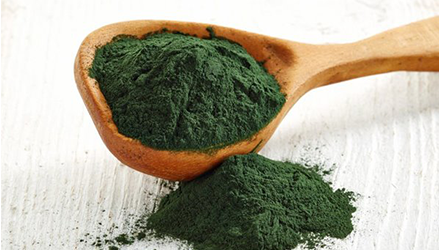Raw material

Photoreactive raw material
- Raw material name
-
- Spirulina extract
Key Features
Spirulina, a blue-green algae that grows in warm, clean waters, is a type of microorganism and the oldest algae on Earth. It is named after the Latin word for spiral, and as a type of cyanobacteria, it grows in seawater and hot tropical waters with high salinity and strong alkalinity, so it is possible to cultivate it artificially and mass-produce it.
Spirulina was used in ancient Africa and Mexico, and has been gaining attention as a superfood in Korea and around the world for several years due to its high protein content, carbohydrates, lipids, vitamins, and minerals, which are essential nutrients.
Spirulina's pigments include yellow carotenoids, green chlorophyll, and blue phycocyanin. Phycocyanin is a bile pigment contained in spirulina that is not found in chlorella. Like animal bile pigments, it helps digest fat and exhibits anti-inflammatory and antioxidant properties. These antioxidants help remove active oxygen, enhance immunity, and have anticancer effects. In addition, phycocyanin, an antioxidant pigment created to protect itself from strong light, helps prevent skin aging, improve skin condition, provide moisture, and protect skin barrier function.


